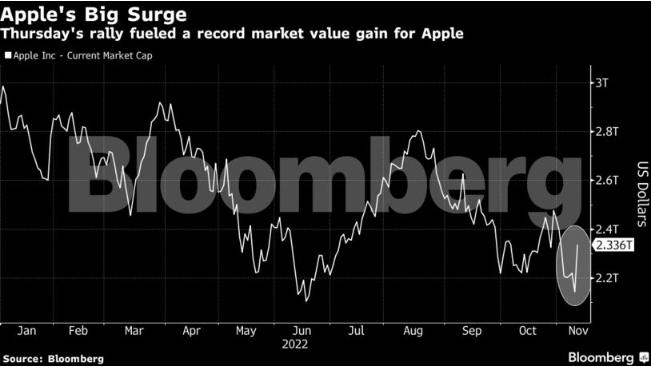Apple Stock Surge: Biggest Weekly Gain Since July 2020

In the wake of a significant visit to the White House, Apple stock surged dramatically, positioning itself for its most prosperous week since July 2020. With shares soaring by 13%, the tech giant’s largest weekly gain in over five years was celebrated following CEO Tim Cook’s meeting with President Donald Trump. This encounter played a pivotal role as they unveiled Apple’s ambitious plan to invest $100 billion into American businesses over the next four years, bolstering the country’s manufacturing sector. Moreover, the White House announced that Apple would be exempt from impending tariffs on imported chips, a relief for investors concerned about potential costs. This impressive rise added more than $400 billion to Apple’s market capitalization, cementing its place among the top three most valuable companies in the world, alongside Microsoft and Nvidia, while reaffirming the strength and resilience of Apple shares in today’s market.
The recent rapid increase in Apple’s share price marks a remarkable event in the financial landscape, likely influenced by significant corporate announcements and official visits. Following Tim Cook’s presentation at the executive level at the White House, the company signaled a robust strategy to channel investments into U.S. ventures and American-made components. This strategic pivot not only reflected Apple’s commitment to local manufacturing but also alleviated investor concerns regarding potential trade tariffs on imported goods. As the company’s market value continues to climb at an unprecedented rate, discussions around investing in domestic industries have gained momentum, suggesting a turning point in how leading tech firms, like Apple, engage with legislative communities. The intersection of corporate strategy and national economic policies is redefining the narrative around tech investments and their implications for the marketplace.
Apple Stock Surge Following White House Visit
The recent surge in Apple stock has been attributed to a notable 13% increase, marking its most significant weekly gain since July 2020. This leap was sparked by Tim Cook’s appearance with President Trump at the White House, where major announcements were made regarding Apple’s future investments. Analysts suggest that the strategic commitments made during this visit have reignited investor confidence, leading to a substantial uptick in Apple shares.
With Apple’s market capitalization reaching an impressive $3.4 trillion, the company’s remarkable rebound this week has realigned its position as one of the foremost tech giants in the market. Investors are closely monitoring the potential impact of the announced $100 billion investment in American businesses, which could bolster domestic growth and shield Apple from future tariffs, factors that are entirely positive for its stock performance.
Moreover, this swift recovery can partly be credited to the anticipated economic stability this investment can bring. Tim Cook emphasized the importance of purchasing American-made components and chips, which not only appeases political pressures but also enhances Apple’s operational framework. The exemption from future tariffs has further paved the way for Apple to maintain its competitive pricing, thereby attracting more investors to its stocks.
The timing of this announcement was crucial as it followed a notable quarter for Apple, where the company reported a 10% increase in overall revenue and a significant boost in iPhone sales. These combined elements create a favorable environment for continued stock growth, reinforcing Apple’s stature within the technology sector.
Implications of Tim Cook’s White House Engagement
Tim Cook’s engagement with President Trump at the White House has profound implications for Apple’s future trajectory and its relationship with the U.S. government. By committing to invest $100 billion into American businesses over the next four years, Apple is not only bolstering its domestic manufacturing capabilities but is also positioning itself favorably in the face of ongoing trade disputes and tariffs. This dialogue signifies a potential shift towards more collaborative relations between major tech firms and government, emphasizing a focus on national economic interests.
Additionally, the visit served to alleviate investor concerns regarding the adverse effects of potential tariffs on profitability. Apple had previously warned about the financial burden stemming from Trump’s trade policies, estimating over $1 billion in tariff-related costs. However, the assurance that Apple would be exempt from future tariffs creates a more secure investment landscape for stakeholders, banking on robust profit margins and sustained growth.
Moreover, Cook’s remarks about purchasing U.S.-manufactured chips indicate not only a commitment to the American workforce but also a strategic pivot to lessen dependence on foreign suppliers. By increasing local sourcing, Apple aims to mitigate supply chain disruptions that can arise from geopolitical tensions, a topic of paramount importance in today’s economic climate.
This proactive stance also reinforces the narrative of investing in American businesses, promoting job creation, which resonates positively with both consumers and investors alike. Analysts believe that such strategic moves will further solidify Apple’s reputation as a forward-thinking tech powerhouse, ultimately leading to sustained financial success.
The Future of Apple’s Market Capitalization
Apple’s market capitalization has recently surpassed a remarkable $3.4 trillion, and with the favorable outcomes of Tim Cook’s White House visit, analysts predict a positive trajectory for future valuations. This sharp increase in Apple shares has not only solidified its position as the third most valuable company in the world but also has significant implications for the broader technology sector. Investors often look to Apple as a barometer for market health, and its recent performance suggests a resilient rebound amidst previous economic uncertainties.
The ongoing investment in American businesses will likely yield long-term benefits, boosting Apple’s innovation capabilities and creating robust economic ties with the domestic market. With Cook’s commitment to local manufacturing, Apple is strategically placing itself to harness growth within the U.S., potentially becoming a leader in the technological advancements that economic recovery demands.
Additionally, as Apple continues to expand its portfolio with American-made components, it can create a competitive edge that may lead to enhanced product offerings and improved margins. The successful integration of domestic supply chains will not only cater to the company’s operational efficiency but also fortify its public image as a responsible corporate citizen supporting the local economy. Analysts believe that this approach could lead to increased investor confidence, spurring a subsequent rise in Apple’s market cap as the company continues to demonstrate solid financial health and growth potential.
Strategic Investment Plans for American Businesses
Apple’s announcement to invest a staggering $100 billion in American businesses over the next four years underscores a strategic pivot towards bolstering domestic growth. This commitment is not merely a reactionary measure to political pressures but a calculated investment in future-proofing Apple’s supply chains and reinforcing its manufacturing capabilities. By focusing on American-made components, Apple aims to fortify its operational efficiency while strengthening its brand perception among consumers who increasingly value local sourcing.
Such initiatives also resonate with investors who seek growth stocks tied to ethical business practices and national interests. As Cook elaborated on this vision during his White House appearance, it became apparent that Apple intends to leverage its influence to drive economic growth in America, ultimately enhancing shareholder value and market presence.
Moreover, investing in American businesses opens doors to forming strategic partnerships and collaborations that can lead to advantageous innovations and technological advancements. As Apple’s commitment unfolds, the ripple effects could manifest in more job creation and economic stimulation on multiple levels. This strategic approach is likely to attract not only investor attention but also bolster Apple’s standing as a technology leader dedicated to sustainable development and community involvement.
The implications of this radical investment shift will be closely watched as stakeholders evaluate how it impacts Apple’s overall positioning in the global tech landscape. Positive outcomes from this initiative could catalyze further investments, setting a precedent for how corporations can engage in national economic growth.
The Role of Tariffs in Apple’s Pricing Strategy
The discussion around tariffs has long been a point of concern for Apple, especially as the company navigates the complexities of international trade. With the recent assurances from President Trump that Apple would be exempt from newly imposed tariffs, the company’s pricing strategy could see a significant advantage. Historically, tariffs have pressured companies like Apple to either absorb costs or increase prices for consumers, potentially affecting sales figures. However, with this new exemption, Apple can maintain more stable pricing strategies while ensuring profitability.
This favorable outcome also allows Apple to strategize more effectively in terms of product launches and market expansions. With the alleviation of potential tariff-induced costs, the company can redirect resources toward innovation and development, strengthening its competitive position in the technology sector.
Furthermore, navigating the tariff landscape requires a delicate balance in supply chain management. By investing in U.S. manufacturing, Apple not only appeases regulatory concerns but also potentially mitigates risks associated with foreign suppliers who might be impacted by fluctuating tariff policies. This proactive adjustment in its operational strategy underscores the importance of adaptability for companies in today’s globalized market.
As Apple reinforces its domestic supply chains and benefits from tariff exemptions, investors will likely view these developments as positive indicators of the company’s financial health. This combination of strategic planning and favorable trade policies will enhance Apple’s resilience, making it a more attractive investment in the eyes of market participants.
Analyzing Apple’s Revenue Growth Post White House Meeting
Following the recent White House meeting, Apple reported impressive revenue growth, showcasing a 10% increase in overall revenue and a substantial 13% rise in iPhone sales. These figures indicate a strong market response and much optimism surrounding Apple’s performance as analysts begin to reassess their projections for the company. The company’s financial health, coupled with its commitment to invest billions into American businesses, lays a foundation for continued growth and consumer interest.
The surge in revenue is particularly noteworthy in context, as it follows a broader trend in the technology sector where consumer demand for innovative products remains robust. Apple’s strategic decisions and public assurances have been pivotal in driving sales, making the latest results not just a reflection of existing market conditions but also a testament to effective management and strategic foresight.
In essence, the remarkable 13% growth in iPhone sales can be viewed as a direct result of Tim Cook’s recent initiatives. By aligning Apple’s business strategy with national priorities and consumer expectations, the company has successfully rekindled interest among potential buyers. As consumers become increasingly aware of Apple’s commitments to local sourcing and manufacturing, it could further bolster brand loyalty and consumer support.
Investors are undoubtedly encouraged by these developments as they indicate not just a rebound but a sustainable growth trajectory post the White House meeting. As Apple continues to capitalize on its strengths, the potential for maintaining this revenue growth against a backdrop of favorable economic policies becomes increasingly promising.
Investor Sentiment Following Apple’s Recent Gains
The recent gains in Apple’s stock have significantly boosted investor sentiment, signaling a renewed sense of confidence in the tech giant’s future. The positive outcomes from Tim Cook’s White House visit, along with strategic announcements regarding investments in American businesses, have invigorated market interest in Apple shares. Analysts report that this renewed confidence is not only due to the large financial commitments made by Apple but also the favorable political reception these investments have garnered from the administration.
Many investors view Apple’s stock as a prime opportunity for growth, especially within the context of its elevated market capitalization and promising earnings prospects. With the precedent of Apple’s recent successes, the stock is likely to be further supported by optimistic investor sentiment in upcoming quarters.
Moreover, as investor sentiment rebounds, attention will shift towards how Apple continues to leverage its position to further enhance shareholder value. The stock’s performance in the wake of significant announcements will be closely watched, as it provides insights into market dynamics and consumer behavior in response to Apple’s strategic moves. Analysts suggest that consistent communication and transparent investment strategies will be crucial in maintaining this momentum.
Continually engaging with stakeholders and addressing market concerns can help Apple sustain interest from investors and ensure continued growth. The current trajectory reflects not only the company’s resilience but also the potential for ongoing success despite the challenges posed by global economic uncertainties.
Conclusion: Apple’s Strategic Path Forward
In conclusion, Apple’s recent strategic moves, including the impressive stock surge and commitments to investing in American businesses, mark a pivotal moment for the tech giant. As Apple’s shares rise, bolstered by positive investor sentiment and favorable market conditions, the company is well-positioned to maintain its leadership in the technology sector. Tim Cook’s White House visit not only highlighted significant financial commitments but also reaffirmed Apple’s dedication to domestic manufacturing, showcasing its adaptability and foresight in a rapidly evolving market.
As Apple moves forward, clarity in investment strategies and continuous innovation will be key to sustaining this growth trajectory. By focusing on domestic production and cultivating relationships with the American workforce, Apple is set to enhance its competitive edge, making it a case study in effective corporate strategy within the tech industry.
As the technology landscape continues to shift, Apple’s ability to navigate challenges while fostering relationships with policymakers suggests a robust future. This strategic alignment with national interests reaffirms the company’s commitment to its core values while enhancing its market capitalization and positioning in the tech realm. Moving forward, Apple’s journey toward reinforcing its leadership will be one to watch, as the company continues to innovate and adapt in a complex global environment.
Frequently Asked Questions
What factors contributed to the recent Apple stock surge?
The recent Apple stock surge, which saw a 13% increase in shares, can be attributed primarily to CEO Tim Cook’s visit to the White House. During this visit, Apple announced plans to invest $100 billion in American businesses, which reassured investors about the company’s commitment to U.S. manufacturing. Additionally, assurances from President Trump that Apple would be exempt from future tariffs on imported chips also positively influenced the market.
How does the Tim Cook White House visit impact Apple’s market capitalization?
Tim Cook’s White House visit had a significant positive impact on Apple’s market capitalization, which increased by over $400 billion following the company’s announcement of a $100 billion investment in American businesses. The surge in shares after the visit boosted Apple’s total market cap to approximately $3.4 trillion, further solidifying its position as one of the most valuable companies in the world.
What are the implications of tariffs on Apple shares?
Tariffs have been a major concern for investors in Apple, especially as the company projected over $1 billion in tariff costs for the current quarter. However, the recent announcement during Tim Cook’s White House visit indicated that Apple would be exempt from future tariffs on imported chips, alleviating concerns and resulting in a surge in Apple shares. This exemption supports the stock’s upward trajectory by addressing investor anxieties about profitability.
How significant is the 13% increase in Apple shares this week?
The 13% increase in Apple shares this week marks the largest weekly gain in over five years, showcasing strong investor confidence. This surge, influenced by Tim Cook’s announcement of a substantial investment in American businesses and the assurance of tariff exemptions, has greatly contributed to Apple’s commanding market capitalization and positions the company favorably against competitors.
Why is investing in American businesses important for Apple?
Investing in American businesses is crucial for Apple as it enhances its reputation, promotes local job creation, and mitigates risks associated with international trade policies. The recent pledge of $100 billion to U.S. companies signals Apple’s long-term commitment to domestic manufacturing, which can positively impact its stock performance and overall stability in the face of global economic challenges.
What role did the announcement of investing in domestic chips play in Apple stock’s performance?
The announcement of Apple’s commitment to purchasing more domestic chips played a pivotal role in the surge of Apple stock. This commitment, coupled with Tim Cook’s assurances during his visit to the White House, reassured investors about the company’s responsiveness to market conditions and tariff implications, boosting confidence and driving the stock price up significantly.
What can investors expect from Apple’s stock after the recent surge?
Following the recent surge in Apple’s stock, investors can expect potential continued growth, especially with the confidence instilled by Tim Cook’s announcement of $100 billion investments in American businesses and the elimination of tariff threats. However, market volatility and external economic factors remain considerations for future stock performance.
How does Apple’s stock performance compare to its competitors?
Apple’s recent stock performance, highlighted by a 13% increase in one week, positions it competitively against peers like Nvidia and Microsoft. With a market capitalization of $3.4 trillion, Apple has managed to maintain its status as one of the top three most valuable companies, indicating strong investor support and confidence in its long-term outlook.
| Key Point | Details |
|---|---|
| Apple’s Stock Surge | Apple’s shares rose by 13% this week, marking its largest weekly gain since July 2020. |
| Visit to the White House | CEO Tim Cook met President Donald Trump, announcing an investment plan of $100 billion in American companies. |
| Tariff Exemption | Apple will be exempt from future tariffs on imported chips due to its investment in U.S. manufacturing. |
| Market Capitalization | The surge added over $400 billion to Apple’s market cap, which now stands at $3.4 trillion. |
| Valuation Ranking | Apple is currently the third most valuable company, following Nvidia and Microsoft. |
| Analyst Opinion | JP Morgan’s analyst praised Cook’s management of uncertainty regarding tariffs, maintaining an ‘overweight’ rating on Apple. |
| Earnings Report | Apple reported a 10% increase in overall revenue and a 13% rise in iPhone sales for the June quarter. |
Summary
The Apple stock surge this week highlights a significant turnaround for the tech giant, driven primarily by strategic decisions made during a key meeting at the White House. With a remarkable 13% rise in shares, investors have reacted positively to Apple’s commitment to invest heavily in American manufacturing, particularly in the domestic chip sector. This move not only strengthens Apple’s standing in the market but also exempts it from potential tariffs, thus alleviating investor concerns about profit margins. As Apple continues to innovate and expand its influence, it remains a pivotal player in the tech industry with a robust market capitalization standing.




